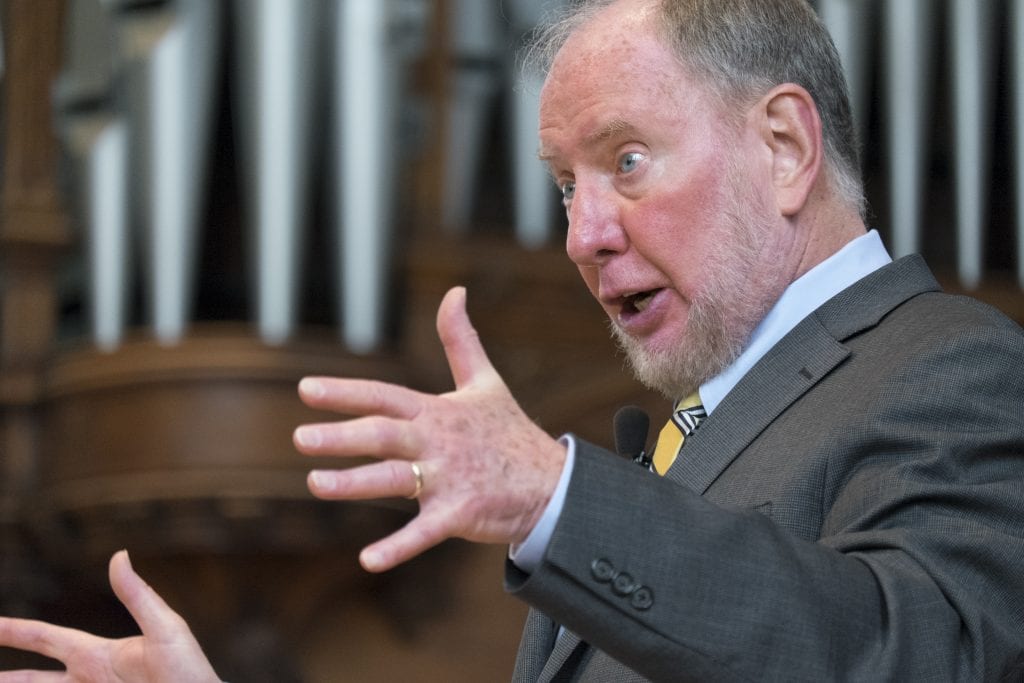Robert Putnam grew up in Port Clinton, Ohio. Back then, in the 1950s, children from both sides of the tracks in his working-class town went to school together, played sports together, knew each other and watched out for each other.
Also, humble class origins were not a barrier to economic mobility. In fact, 80 percent of Putnam’s graduating class did better than their parents, according to his research. After high school, while some of Putnam’s classmates stayed in the town along Lake Erie for manufacturing jobs, he went to college, where he met his wife. His children attended college, and his seven grandchildren are in college or heading there, he says.
Now, everyone who went to college, raise your hand, Putnam tells a crowd gathered Wednesday at Graham Chapel on Washington University in St. Louis’ campus. Almost everyone does.
“Right,” Putnam says, nodding. “When I say rich, I mean you. And me. And your kids.”
Since the 1970s, American society has split along class lines, and the gap between rich children and poor children is widening, Putnam says, pacing in front of the pulpit. The Harvard professor, political scientist and best-selling author of “Bowling Alone: The Collapse and Revival of American Community” calls the opportunity gap between children “the most important domestic challenge facing our country.”
Traveling the country speaking about his new book, “Our Kids: The American Dream in Crisis” (Simon & Schuster), Putnam is calling on Americans, with our “shriveled sense of ‘we,’” to help children and to act now to revive the American dream. His speech on Wednesday was a Center for Social Development 20th Anniversary event.
In modern-day Port Clinton, Putnam’s hometown, East Harbor Road is the dividing line between the haves and the have-nots. On one side, almost no children live in poverty. On the other, half of the children do. Gated communities with million-dollar homes show the isolation of the town’s children. To illustrate the fate of some of his hometown’s “grandchildren,” Putnam, now 74, mentions his granddaughter Miriam: “She chose well-educated parents.” Another child, whom he calls “Mary Sue,” did not. Her parents split, and her mother worked as a stripper and abandoned her. Mary Sue knew hunger, and she knew loneliness. Today, he says, she in an impoverished young woman who doesn’t trust anyone and feels like nobody loves her.
“Mary Sue is a real person,” and her story embodies that of the lower third of American society, Putnam says. “It’s not just a Rust Belt story.” He and his team of researchers interviewed children and families in Bend, Oregon, Orange County, California, Duluth, Minnesota, Seattle, Boston, Atlanta and other places and found growing opportunities for rich children and “plummeting opportunities for poor kids.”
Family and social bonds are fraying within the working class as the gap between children born to educated parents and those who aren’t is widening, Putnam says. During his speech, he displays a series of “scissors charts” showing diverging trends between upper- and lower-class children, and the clear winners every time are upper-class children. Those children are more likely to eat dinner with their families, play team sports and join in other school-based extracurricular activities, have parents who read to them, spend money on them, and spend time with them.
“In the 70s, both poor kids and rich kids got the same amount of time with mom and dad,” Putnam says.
Time with parents matters, he points out. “Our brains are programmed to develop during social interaction,” and such time spent predicts later IQ and success in life, he says.
If you are growing up poor in America, “you are alone and on your own,” Putnam says.
For instance, “all kids get in trouble,” he says, but “in our communities, airbags inflate” to minimize the damage and to turn a spot of trouble into a learning experience. Parents can hire a good lawyer to defend a child, and life goes on. But for poor kids, no airbags exist, he says.
As for college, the deck is stacked in a way that flies in the face of a fundamental principle of America: People can improve their lives by their own efforts.
“Rich dumb kids are more likely to graduate from college than smart poor kids,” Putnam says. Family income now matters more than your personal abilities, he says.
Inequality among American children is a moral issue, he says, and one Americans must tackle. “My Miriam,” he says, referring to his granddaughter, “is going to be living in a poorer America because we didn’t invest in Mary Sue.”
Putnam’s policy suggestions are many and include boosting jobs and wages, reforming prisons, improving early childhood education, coaching parents, extending family leave, investing in public education, and putting an end to “pay to play” school-based sports.
“We can fix this problem,” he says. “We can.”
Putnam is the Malkin Professor of Public Policy at Harvard and the author of 14 previous books.
Co-sponsors of the event, in addition to the Center for Social Development, included the Center for Household Financial Stability of the Federal Reserve Bank of St. Louis; the Weidenbaum Center on the Economy, Government, and Public Policy; the Ferguson & Beyond Lecture Series; the Department of Sociology at Washington University in St. Louis; the Gephardt Institute for Public Service; and Brown School’s Policy Forum.
To see photos from the event, please click here.
